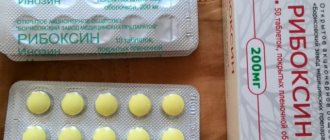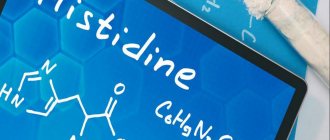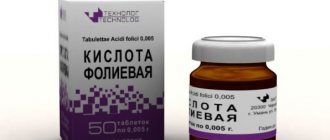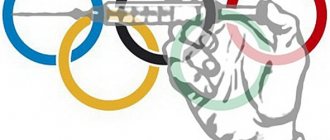For athletes, the process of building muscle mass is quite long, which is why various dietary supplements are often used in bodybuilding, and a special sports diet is also established. Glycine in bodybuilding is used as an aid to reduce stress during exhausting strength training, it helps the body recover faster and build muscle mass faster. It is worth noting that this drug has a lot of useful properties; before taking Glycine, you should familiarize yourself with its mechanism of action and application regimen. Thanks to a comprehensive analysis of drugs, it will be possible to determine the need to take the supplement during intense physical activity.
Effect on the body
Glycine is a neurotransmitter acid. In the brain and spinal cord, glycine sensory neurons are the most common inhibitory receptors.
By joining them, this amino acid reduces the release of excitatory substances from nerve cells and increases the release of gamma-aminobutyric acid, the most important inhibitory neurotransmitter of the central nervous system. Glycine also has an inhibitory effect on spinal cord neurons responsible for maintaining muscle tone and motor coordination.
Glycine has the following effects:
- reduction of emotional stress;
- reduction of aggressiveness;
- improving the ability to socially adapt;
- increased emotional tone;
- Facilitation of falling asleep, normalization of sleep;
- reducing the negative consequences of exposure to toxic substances on brain tissue (including ethanol, toxic compounds of medications);
- restoration of the structure and function of brain cells after injury, inflammation, and ischemia.
Glycine molecules are small, so they freely enter the tissues and fluids of the body and overcome the blood-brain barrier. In cells, the compound breaks down into water and carbon dioxide, which are easily excreted, so glycine does not accumulate in tissues.
Effect on NMDA receptors
They are responsible for learning processes and memory function. In one experiment, after switching off NMDA receptors in mice, the rodents stopped remembering simple truths. Thus, we can safely say that NMDA receptors are of fundamental importance for increasing intelligence. To summarize the information received, glycine can not only calm you down, but also improve memory and the learning process.
Application in medicine
Glycine is used mainly in neurological practice as a nootropic and anti-anxiety drug, and a mild antidepressant. It is prescribed to patients taking heavy antipsychotics, neuroleptics, strong sleeping pills, and anticonvulsants to reduce the intensity of negative side reactions.
The amino acid is also used by some narcologists in the treatment of withdrawal syndromes that develop during withdrawal from alcohol, opiates and other psychoactive substances, as a sedative and tranquilizer. Sometimes it is prescribed to improve memory and mental activity, associative processes.
A 1.5% glycine solution is used during transurethral surgical interventions in urological practice to wash the urethra.
The role of the drug for people with physical activity
People who do not engage in sports and those who have significant physical activity are guided by the instructions for use of the drug.
Glycine helps athletes:
- increase energy production;
- increase performance;
- develop physical strength through the work of the muscular system;
- calm down before difficult starts;
- improve overall well-being and mood.
Doctors note that glycine strengthens the human immune system, removes toxins and breakdown products from the body, and increases mental activity.
Glycine is necessary for athletes: they receive this supplement in a comprehensive diet or using the drug. The rate of amino acid consumption per day depends on the health status and individual characteristics of the person.
Indications for use
Indications for taking drugs with amino acids:
- decreased intellectual performance;
- being in a state of stress, serious emotional stress for a long time;
- social deviation of children and adolescents;
- ischemic stroke;
- vegetative-vascular dystonia;
- neuroses and neurosis-like conditions;
- various forms of encephalopathies (including those developing in the prenatal period);
- pathologies of the central nervous system, characterized by disturbances of the psycho-emotional background, sleep disorders, excessive excitability, deterioration of intellectual abilities.
Glycine is recommended to be taken to reduce the effects of traumatic brain injuries and infectious diseases of the brain.
The annotation states that the drug has no contraindications. The exception is cases of individual intolerance to the substance. The amino acid is prescribed even to pregnant and lactating women, but the drug can only be taken after consulting a doctor.
Analogues of the drug
Usually there are good reviews about the drug; taking pills in recommended doses will only bring benefits. Today, several analogues are produced that are additionally enriched with vit.B, these include:
- Glycine-Vis
- Glycine Forte Evalar
- Glycine-Bio
- Glycine-Canon.
Taking the supplement while playing sports will help strengthen muscles, as well as normalize the functioning of the cardiovascular system and central nervous system. The use of the drug should be carried out after consultation with a specialist.
Benefits of glycine for athletes
Glycine is necessary for athletes, like all other amino acids from which the body builds protein molecules.
It is important to consume it with food, and additional intake is recommended only during periods of increased stress, especially psycho-emotional ones. For athletes, this is the time of competition, when not only good physical data is needed, but also the ability to assess the situation and concentrate on achieving the goal. Calmness, endurance, and high mental performance are necessary in sports no less than excellent strength, speed and other indicators.
Typically, athletes take glycine in courses of 2-4 weeks during pre-competition training and the competition itself. It lifts your mood, increases motivation, and reduces stress levels.
The amino acid allows you to recuperate as much as possible and promotes speedy recovery during intense exercise.
Recommendations for correct use
The scheme for using “Glycine” in sports is simple and requires strict adherence. Exceeding therapeutic doses of the product will not give more pronounced results, but will only provoke negative consequences. In particular, amino acid abuse threatens rapid depletion of glucose reserves. The body will quickly use up this source of energy, which will lead to metabolic failure, lethargy, and fatigue. Also, systematically exceeding the permissible volumes of the composition is fraught with the accumulation of lactic acid in the tissues. Under the influence of physical overload, this condition can develop into a lactic acid coma, which threatens not only the health, but also the life of the athlete.
Glycine deficiency
A lack of glycine in the body is manifested by the following symptoms:
- decreased immune status;
- slowing down protein metabolism;
- increased risk of injury;
- deterioration of the condition of hair, nails, skin;
- disorders of the digestive system.
The lack of this amino acid in the body affects the production of growth hormone.
The role of Glycine in bodybuilding
In bodybuilding, special attention is paid to the drug. This is due to the fact that when interacting with simple carbohydrates, this amino acid significantly accelerates muscle development, as well as:
- takes part in the formation of protein in the body;
- develops muscles, cartilage, ligaments, bones and tendons;
- improves mood;
- helps strengthen hair and nails.
Glycine is on par with classic sports nutrition and helps achieve maximum results in sports on a budget.
Food Sources of Glycine
Like other amino acids, humans obtain glycine from food. Its main sources are:
- legumes (soybeans, peanuts);
- beef;
- chicken;
- meat by-products, mainly beef and chicken liver;
- nuts;
- cottage cheese;
- pumpkin seeds;
- chicken, quail eggs;
- cereals, especially buckwheat and oatmeal.
Side effects
In some cases, when taking amino acids, allergic skin reactions develop in the form of skin rash, itching, and urticaria.
Overdoses of glycine were not recorded. This is due to the fact that this compound is naturally present in tissues, and the body will always find a use for the amino acid.
If negative side effects develop while taking the drug, you should stop using it and consult a doctor for advice.
Glycine is an over-the-counter drug that can be freely purchased at any pharmacy. The cost of a package of the cheapest drug of 50 tablets is about 40 rubles, depending on the manufacturer, prices vary greatly.
Glycine and sports nutrition: where it occurs
In sports nutrition, glycine is designated as food additive E640; it is a pronounced taste and aroma modifier. The most popular among bodybuilders include:
- FIT-Rx Glycine 1000 - capsules, each containing 1000 mg of the amino acid in question, the supplement takes an active part in the formation of proteins, enzymes and growth hormone. The package contains 100 capsules; the manufacturer recommends taking 1 capsule once a day. Cost - about 530-550 rubles.
- DMG (DMG) is dimethylglycine, which is considered an absolutely natural substance. The main effect obtained from the supplement is increasing the physical endurance of the body, getting rid of fatigue; in addition, the drug strengthens the immune system and ensures a complete supply of oxygen to the body’s cells. Available in capsule form, the manufacturer recommends taking 1 capsule 2 times a day. The cost of a package of 100 capsules is 1500 rubles.
FIT-Rx Glycine 1000 DMG
- OstroVit Glycine - available in powder form, one scoop contains 3 g of L-glycine (an amino acid purified in a pharmacological laboratory). The supplement acts as a neurotransmitter, that is, it participates in the process of synthesis of collagen and phospholipids by the body’s cells. Take 3 times a day before meals, for which 3/5 scoop of powder should be diluted in 100-150 ml of clean water or non-acidic juice. Consumed 20-30 minutes before meals
OstroVit Glycine OstroVit Glycine
The cost of a 200 g package (example 60-70 servings) is 1800 rubles.
- Glycine 1000 mg 100 caps (NOW) – available in capsules, one containing 1 g of amino acid in free form. The composition additionally contains magnesium stearate and silicon dioxide. The package contains 100 capsules, take 1 capsule 2-3 times a day. The cost of 100 capsules (the amount contained in one bottle) is 800 rubles on average. The supplement is classified as vegetarian, even the additional components are not of animal origin.
Amino acid preparations
Athletes can use not only specific supplements, but also pharmacological drugs as a source of glycine:
| Drug name | brief information | Photo |
| Doppelhertz Active Glycine + vitamins | 1 capsule contains 500 mg of amino acid, vitamins B1, B6 and B12 are added to the composition; the cost of a package of 30 capsules is on average 500 rubles. | |
| Evalar Glycine Forte | It is produced in the form of tablets, each containing 500 mg of the main active ingredient, containing B vitamins, the price of a package of 60 tablets does not exceed 200 rubles. | |
| Solgar | An American manufacturer produces glycine in tablets, each containing 500 mg, there are no additional components in the composition, the cost of a package of 100 capsules is on average 1000 rubles. |
Research
Glycine was first isolated and described by the French chemist and pharmacist Henri Braconneau. The scientist obtained sweet crystals during experiments with gelatin in the 20s of the 19th century. It was only in 1987 that the cytoprotective properties of this amino acid were described. It has been found that it promotes the restoration of living cells after hypoxia. Experiments on animals have shown that this compound is used by the body to neutralize the effects of ischemia - a violation of the blood supply.
However, under conditions of severe stress, for example, during an ischemic stroke, glycine temporarily becomes a conditionally essential amino acid, that is, it cannot be synthesized by the body.
When administered externally, it perfectly protects cells from oxygen starvation. Presumably, glycine reduces the permeability of the cell membrane, thereby maintaining electrolyte balance and preventing the destruction of cellular structure.
Mostly Russian scientists are engaged in research into the properties of the amino acid; in the West it is recognized as ineffective and is practically not studied. The only use of the compound in the United States is as an irrigation solution for interventions performed by the transurethral route.
Russian scientists are more busy researching the nootropic, tranquilizer, antitoxic, and antidepressant properties of glycine. Some of them showed the effect of this compound in eliminating sleep disorders.
Glycine has also shown a neuroprotective effect: when taken in the first 3-6 hours after an ischemic stroke, the drug reduces the extent of its consequences. Russian scientists also came to the conclusion that the use of amino acids has a sedative effect as a nootropic.
Western colleagues do not share the point of view of Russian researchers, believing that all observed actions are due to the placebo effect. Indeed, it has still not been possible to substantiate the effectiveness of the drug using evidence-based medicine.
Beneficial properties for the body
Bodybuilders especially need a regular supply of glycine. It is the main component of creatine , which is responsible for muscle function, especially during high-intensity training.
Glycine in bodybuilding:
- Helps the athlete build muscle mass;
- Plays an important role in the synthesis of growth hormone;
- Improves flexibility and range of motion;
- Protects muscles from exhaustion and overwork;
- Increases energy levels and fights fatigue.
{module Adsense block in the middle of the button}
For people who do not exercise, glycine will also be useful :
- Improving mental performance and memory;
- Prevention of strokes and seizures;
- Protecting skin from aging;
- Strengthening collagen and reducing joint pain;
- Stabilization of blood sugar levels;
- Reducing the risk of developing diabetes;
- Improving sleep quality;
- Reducing inflammation by increasing glutathione synthesis;
- Restoration of the mucous membrane of the gastrointestinal tract;
- Important role in the production of digestive enzymes and red blood cells;
- Reducing allergic and autoimmune reactions;
- Combating the effects of stress and anxiety;
- Control symptoms of seizures, schizophrenia and mental disorders.
According to research conducted by the cell biology departments at the University of North Carolina at Chapel Hill, glycine may be used to reduce symptoms in people suffering from diseases such as ulcers, arthritis, leaky gut, diabetes, kidney and heart failure, neurobehavioral disorders, chronic fatigue , sleep disorders and so on.
Let's look at some of the properties of glycine and their effect on the body, as well as their role in bodybuilding, in more detail.
The amino acid is known as “anti-aging” due to the fact that it prevents the destruction of muscle fibers in old age, stimulates the synthesis of growth hormone, protects joints from destruction, and improves physical and mental performance. All these properties of glycine are important not only for bodybuilders, but also for people who do not play sports.
Protein synthesis in muscles
Glycine is an ideal supplement for bodybuilding as it promotes protein production:
- Increases creatine levels in muscles.
- Delivers nutrients to muscle tissue.
- Regulates fat metabolism, controlling energy consumption.
- Enhances the biofunction of leucine in muscles.
Glycine nourishes “hungry” muscle cells, increases endurance, strength and performance. It also plays an important role in the production and regulation of hormones. The amino acid helps the body naturally synthesize steroid hormones, which regulate the ratio of fat and muscle mass and control the athlete’s energy consumption. Glycine is a source of 2 important amino acids – creatine and leucine.
Muscle recovery
Glycine is an ideal post-workout supplement as it promotes muscle recovery and prevents muscle catabolism. Since glycine creates an increased creatine effect, hence the benefits - muscle cell renewal, assistance in muscle growth and recovery, increased energy levels.
Anabolism in bodybuilding
First, taking glycine improves protein synthesis. Thanks to this amino acid, the biological value of protein increases. Secondly, glycine helps in the synthesis of glutathione, an important antioxidant that reduces oxidative stress.
Protection of joints and cartilage tissue
Glycine, together with proline, is involved in the formation of collagen. Approximately one third of collagen is composed of glycine. Collagen is responsible for the normal functioning of joints, tendons and ligaments. It is also involved in the formation of connective tissue, which is responsible for flexibility and mobility of joints. This is why collagen hydrolyzate is often used to treat joint diseases such as osteoarthritis.
Read: the benefits of collagen for the body
Glycine is also necessary for the formation of elastic and flexible cartilage. It helps restore damaged joints and prevent loss of mobility and functionality in older people.
Improved digestion
Glycine helps restore tissue in the digestive tract. The amino acid is involved in the formation of two important substances - collagen and gelatin. The latter help people with food allergies and sensitivities digest food more easily, and restore the gastrointestinal mucosa in people with inflammatory bowel diseases (leaky gut syndrome, IBS, ulcerative colitis and acid reflux). They also perform a probiotic function.
In the gastrointestinal tract, glycine acts as a metabolic fuel. Which is necessary for the synthesis of bile, nucleic acids, creatine phosphate and porphyrins, which are responsible for the breakdown of nutrients. The amino acid also helps break down fats and transports glycogen into cells to produce energy in the form of ATP. Glycine stabilizes blood sugar levels and reduces sugar cravings. It is a component of a number of drugs to normalize glucose levels and reduce acidity.
{module Adsense block in the middle block (separate)}
Slowing down the aging process
A 2011 study found that the production of glutathione, a valuable antioxidant that prevents cell damage and aging, declines sharply in older people. Taking cysteine and glycine completely restores glutathione synthesis even in adulthood. Glycine is involved in the production of specific antibodies and immunoglobulins.
Fighting fatigue and sleep disturbances
According to research, glycine supplementation improves sleep quality, reduces daytime sleepiness, and restores memory. Glycine is often used to reduce anxiety and nervousness, which interfere with good sleep. In some cases, it is even recommended to take it an hour before bedtime. Plus the amino acid reduces fatigue, preserves energy and provides additional mental and physical fuel for the body.










